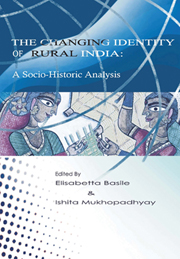Book contents
- Frontmatter
- Contents
- Acronyms and Abbreviations
- About the Authors
- INTRODUCTION
- PART 1 INDIAN RURAL TRANSFORMATIONS
- Identifying Livelihoods in Rural India
- The Institutional Embeddedness of Indian Rural Capitalism
- PART 2 INEQUALITY IN RURAL INDIA
- PART 3 SOCIAL MOVEMENTS AND IDENTITIES
- Appendix 1 Socio-Economic Indicators of Rural India
The Institutional Embeddedness of Indian Rural Capitalism
from PART 1 - INDIAN RURAL TRANSFORMATIONS
Published online by Cambridge University Press: 05 March 2012
- Frontmatter
- Contents
- Acronyms and Abbreviations
- About the Authors
- INTRODUCTION
- PART 1 INDIAN RURAL TRANSFORMATIONS
- Identifying Livelihoods in Rural India
- The Institutional Embeddedness of Indian Rural Capitalism
- PART 2 INEQUALITY IN RURAL INDIA
- PART 3 SOCIAL MOVEMENTS AND IDENTITIES
- Appendix 1 Socio-Economic Indicators of Rural India
Summary
This paper is about the nature and working of Indian rural non-farm capitalism, that part of Indian economy that consists of small towns (under 2,00,000 people) and rural areas – often referred to as ‘provincial capitalism’ (Chari, 2004) and ‘regional capitalism’ (Baru, 2000) – in which the vast majority of Indian population lives and works (Harriss-White, 2003). After the Green Revolution, this part of Indian economy has undergone a widespread industrial transition giving birth to a pattern of non-farm growth in which social structures and power relations inherited from colonial and pre-colonial past are intertwined in capitalist production relations. Rural non-farm capitalism appears to be markedly distinct from Indian corporate capitalism and is still largely unexplored.
Addressing Indian rural non-farm capitalism as a distinct section of the Indian economy, this paper contributes to the debate on contemporary capitalism within the vast literature that goes under the rubric of ‘Varieties of Capitalism’. In broad terms, this literature rejects the view that a pure capitalist system exists as a model to all countries, to explore instead ‘real’ capitalist systems, pointing out the differences among them that are seen to depend on their institutional features. Accordingly, my major aim is to show that Indian rural capitalism is based on structures and relations that are ‘institutionally embedded’, i.e. that are specific to the Indian countryside, being determined by the institutional framework that the country has inherited from her past history and culture.
- Type
- Chapter
- Information
- The Changing Identity of Rural IndiaA Sociohistoric Analysis, pp. 31 - 62Publisher: Anthem PressPrint publication year: 2009



